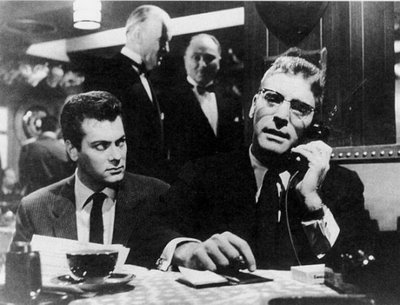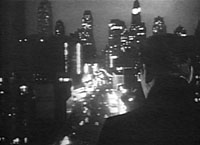
How does a director whose credits include Ealing comedy classics like The Man in the White Suit (1951) and The Ladykillers (1955) find himself unable to build a career? Well, it seems all Alexander Mackendrick had to do was come to the United States, helm Sweet Smell of Success (1957), star Burt Lancaster and Tony Curtis, and hire writer Clifford Odets and master cinematographer James Wong Howe. The result is one of those strange moments when a near-perfect movie is initially scorned, by both audiences and critics--so someone, it seems, must be blamed. And Mackendrick, as director, would be the logical choice. After Sweet Smell of Success, he never regained his footing; while respected--in 1969 he was made Dean of the Film Department of the California Institute of the Arts--he went on to direct only a handful of minor films.
This is a great loss, because his American debut is risky and brilliantly executed, a fast-talking, late-noir expose not only of the dark side of show business but of the American urge toward greatness--with, in passing, a creepy king-sized dose of Freudian mad love. Hmm. Considering all that, it's failure to please in 1957 makes sense. Bathed in "Low-Key" Howe's deep-focus camerawork, the film gives us a New York that, both on the street and in its smoky nightclubs and bigshot eateries, comes off as a giant, glistening snake, black and sparkling in perpetual midnight. It's the perfect setting for the story of J.J. Hunsecker, make-em-and-break-em columnist--played by Lancaster with his patented clipped glee, arch and almost prissy, but sharp as a serpent's tooth--and his uncomfortably close bond with his sister, Susan (Susan Harrison), whom J.J. wants all to himself. Her relationship with a jazz musician, Steve Dallas (Adam-12's Martin Milner), sends him into sinuous rage, and to break up their romance he enlists the help of a seedy publicity agent, Sidney Falco, played by Tony Curtis with Newyawk perfection, looking seriously beautiful--as a starlet observes, she took him for an actor because he was "so pretty"--but also deeply fed up with being Hunsecker's toady.
 The "clash by night" between Hunsecker's amour fou and Sidney's redemptive self-loathing provides everyone with the rare opportunity to chew up the scenery with perfect finesse, a kind of controlled chaos that results in a Beat Generation Citizen Kane, in which the American hero--success-driven, commanding, ruthless--implodes under the weight and pressure of his own obsession. Kane famously toasts to "love on my own terms." In Sweet Smell of Success, those terms come with the throbbing heft of a blackjack, as blackly ripe as the shadows Howe pulls out of the cityscape, pressing down on all concerned--including the soon-to-be-smothered career of its director. While Lancaster and Curtis went on to films in which challenges were met and promises delivered, Sweet Smell of Success claimed its sacrifice in Mackendrick; as nasty as the thing is, I suppose it had to sink its fangs into someone.
The "clash by night" between Hunsecker's amour fou and Sidney's redemptive self-loathing provides everyone with the rare opportunity to chew up the scenery with perfect finesse, a kind of controlled chaos that results in a Beat Generation Citizen Kane, in which the American hero--success-driven, commanding, ruthless--implodes under the weight and pressure of his own obsession. Kane famously toasts to "love on my own terms." In Sweet Smell of Success, those terms come with the throbbing heft of a blackjack, as blackly ripe as the shadows Howe pulls out of the cityscape, pressing down on all concerned--including the soon-to-be-smothered career of its director. While Lancaster and Curtis went on to films in which challenges were met and promises delivered, Sweet Smell of Success claimed its sacrifice in Mackendrick; as nasty as the thing is, I suppose it had to sink its fangs into someone.
No comments:
Post a Comment